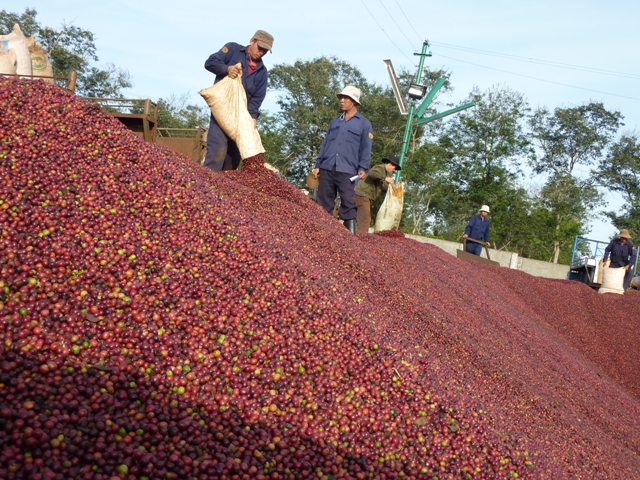 Economy
Economy


|
| Coffee exports reached 1.26 million tonnes, valued at US$2.17 billion, down 12.5 per cent in volume and 20.9 per cent in value compared to the same period last year.— Photo baodautu.vn |
HÀ NỘI — As coffee exports dropped in both volume and turnover in the first nine months of this year, the Ministry of Industry and Trade said improving product quality and brand development are key for coffee export growth.
Coffee exports reached 1.26 million tonnes, valued at US$2.17 billion, down 12.5 per cent in volume and 20.9 per cent in value compared to the same period last year.
To get Vietnamese coffee into foreign distribution systems, the Ministry of Industry and Trade said it would implement the scheme to help Vietnamese enterprises participate in overseas distribution networks by 2020, aiming to bring Vietnamese coffee directly into foreign markets.
One of the activities includes programmes to connect overseas Vietnamese enterprises in Thailand, France, Germany and Australia with domestic businesses, using overseas networks to help Vietnamese coffee enterprises study export markets.
Communication about the quality of Vietnamese coffee is expected to contribute to its consumption in supermarkets in foreign markets.
Sharing his experiences on exports in the coffee industry, Trần Tấn Thiện, director general of Hello 5 Coffee Joint Stock Company, said Vietnamese coffee exporters should improve the quality of their products to the world-level, not regional.
“By doing so, Vietnamese businesses exporting coffee will have better access to the EU, US, Chinese, Japanese, and Korean markets,” he told Thời Báo Kinh Doanh (Business Times).
“This requires Vietnamese enterprises to always set the criteria to go further when the coffee market is growing fast and fiercely competitive,” he added.
Enterprises also needed to choose their target markets, he advised.
The director general noted that coffee exports coffee needed to adapt quickly to international e-commerce channels such as Amazon, Alibaba and Baidu.
The world market was aiming at safe, green and good production for consumers, which was an opportunity for businesses producing safe coffee, he added.
“Enterprises should also choose existing regional advantages,” Thiện said. — VNS